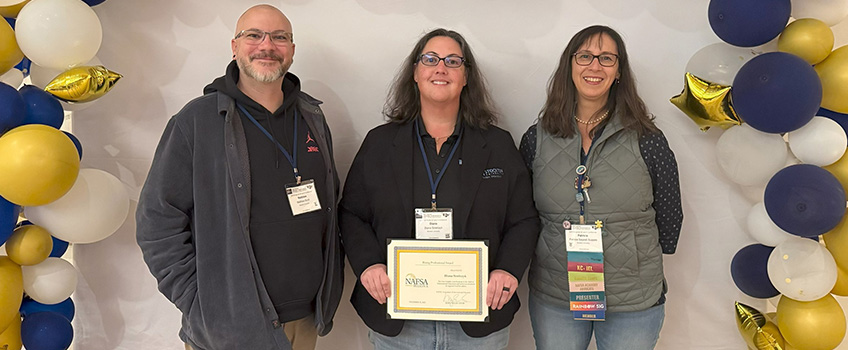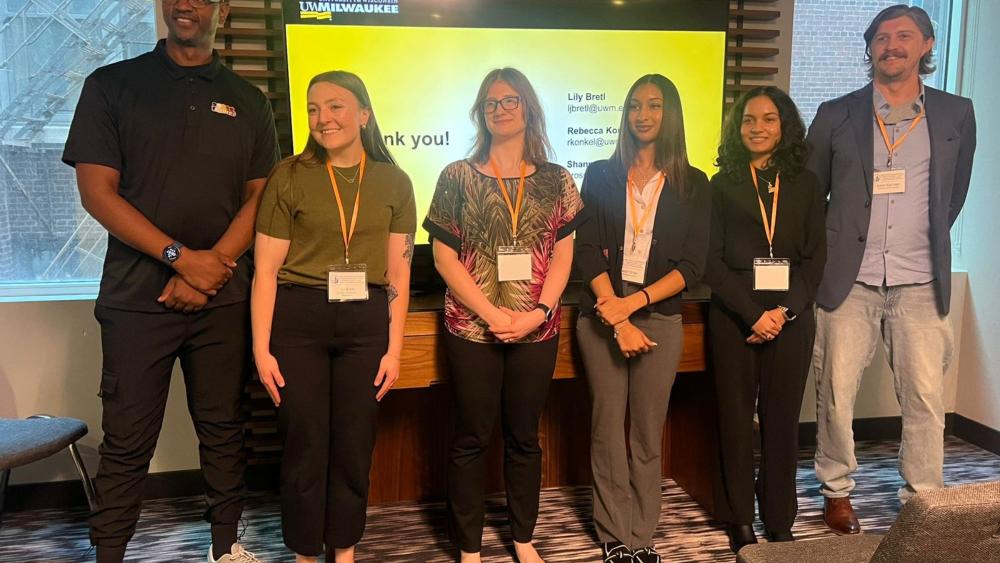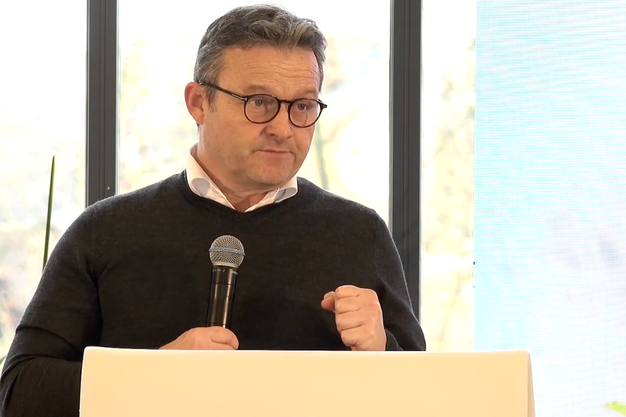Office of Global Engagement Attends Biregional NAFSA Conference – Stockton University

Office of Global Engagement Advances Sustainable Development Goals through International Education Leadership
Strategic Engagement and Partnerships for the Goals (SDG 17)
The Office of Global Engagement (OGE) at Stockton University participated in the 2025 Biregional NAFSA Conference in Philadelphia from October 14-17. This engagement underscores a commitment to fostering global partnerships to achieve the Sustainable Development Goals. The OGE team, including Patricia Sagasti Suppes, Diana Strelczyk, Matthew Birch, and Jocelyn Gray, leveraged the conference to network with international education professionals, sharing best practices and strengthening collaborations essential for advancing global learning initiatives.
Fostering Quality Education and Global Citizenship (SDG 4)
The conference highlighted individual and office-wide contributions to providing inclusive and equitable quality education. A significant achievement was the recognition of Diana Strelczyk, Assistant Director of Education Abroad, with the Region X Rising Professional Award.
- Professional Recognition: The award acknowledges Ms. Strelczyk’s commitment to international education and active engagement in professional initiatives, reflecting a dedication to lifelong learning and professional development within the sector.
- Promoting Equitable Access: Ms. Strelczyk emphasized that education abroad is a high-impact practice that offers life-changing growth. Her mission to inform all Stockton students of these opportunities directly supports SDG Target 4.7, which aims to ensure all learners acquire the knowledge and skills needed to promote sustainable development, including through education for global citizenship.
- Enhancing Program Standards: Her certification in “The Standards of Good Practice in Education Abroad” from The Forum on Education Abroad directly enhances the quality of Stockton’s programs. This credential equips her to better advise students, train faculty, and improve administrative systems, ensuring a higher standard of quality and safety in global education.
Building Resilient and Inclusive Educational Institutions (SDG 16 & SDG 4)
The OGE’s leadership activities at the conference also focused on building effective, accountable, and inclusive institutional practices, a core component of SDG 16.
- Risk Management and Institutional Strength: Patricia Sagasti Suppes, Director of the OGE, conducted a NAFSA Core Education Program workshop on “Risk Assessment and Crisis Management in Education Abroad Programming.” This training contributes to building more resilient and safer international programs, which is fundamental for strong institutions. The workshop’s content is being used to review and update Stockton’s own risk management procedures, ensuring best practices are implemented.
- Professional Resilience and Well-being: Ms. Sagasti Suppes also co-presented a session titled “I’m Still Standing: Telling Our Stories as International Educators.” This session provided a platform for professional reflection, helping educators navigate challenges and build resilience, which is crucial for sustaining the quality and vitality of international education departments.
Strategic Outlook and Future Commitments
The OGE is in a strategic rebuilding phase, aligning its objectives with the university’s new strategic plan and the broader Sustainable Development Goals.
- Increasing Inclusive Participation: A primary focus is to amplify participation in education abroad, working towards reducing inequalities (SDG 10) in access to global learning.
- Supporting Global Learners: The office is developing stronger programs to support international students, fostering an inclusive campus environment.
- Advancing Global Citizenship: The upcoming International Education Week (November 17-21) will serve as a key platform to promote intercultural understanding and the principles of global citizenship across the university community, directly contributing to SDG 4.
Analysis of Sustainable Development Goals in the Article
-
Which SDGs are addressed or connected to the issues highlighted in the article?
The article primarily addresses issues related to two Sustainable Development Goals:
- SDG 4: Quality Education: The entire article focuses on enhancing the quality and reach of higher education through international programs. It discusses “global learning,” “education abroad,” and professional development for educators, all of which are central to providing a comprehensive and high-quality educational experience. The efforts of the Office of Global Engagement (OGE) to provide students with “life-changing growth personally, academically and professionally” directly support the aim of this goal.
- SDG 17: Partnerships for the Goals: The article highlights the importance of collaboration and networking in the field of international education. The OGE’s attendance at the NAFSA conference, where they participated in “sessions and networking opportunities with international education professionals,” exemplifies the multi-stakeholder partnerships needed to advance global initiatives. Furthermore, supporting faculty in their “international endeavors” and collaborating with other universities (like Prairie View A&M) demonstrates a commitment to building strong partnerships.
-
What specific targets under those SDGs can be identified based on the article’s content?
Based on the article’s content, the following specific targets can be identified:
- Target 4.7: “By 2030, ensure that all learners acquire the knowledge and skills needed to promote sustainable development, including, among others, through education for… global citizenship and appreciation of cultural diversity…” The article’s emphasis on “global learning” and providing students with opportunities for “education abroad” directly contributes to this target. Diana Strelczyk’s mission to “inform all Stockton students of their potential” to study abroad is a direct action toward fostering global citizenship.
- Target 4.b: “By 2020, substantially expand globally the number of scholarships available…” While the deadline has passed, the spirit of the target continues. The article mentions the OGE is “increasing engagement with scholarship and with supporting the faculty in their international endeavors.” This implies an effort to expand access to international education, which often involves facilitating scholarships for both incoming and outgoing students.
- Target 17.16: “Enhance the global partnership for sustainable development, complemented by multi-stakeholder partnerships that mobilize and share knowledge, expertise…” The participation of OGE staff in the NAFSA conference is a clear example of this target in action. Patricia Sagasti Suppes teaching a workshop on “Risk Assessment and Crisis Management” is a direct form of sharing expertise to strengthen international education programs globally.
-
Are there any indicators mentioned or implied in the article that can be used to measure progress towards the identified targets?
The article does not mention official UN indicators, but it implies several ways to measure progress:
- For Target 4.7: Progress can be measured by the number of students participating in education abroad programs, which the OGE is actively trying to “amplify.” Another indicator is the development and implementation of training programs for faculty and staff, such as the “OGE Champions Program,” which aims to mainstream the promotion of global learning across the university.
- For Target 4.b: An implied indicator is the number and value of scholarships secured or promoted by the OGE. The statement about “increasing engagement with scholarship” suggests that tracking this metric would be a measure of their success in expanding access.
- For Target 17.16: The number of staff participating in international conferences and the number of workshops or presentations delivered are direct indicators of knowledge sharing. The article notes that Sagasti Suppes “teaches workshops about once a year,” providing a measurable contribution to this partnership-based target. The development of a strategic plan for the OGE, aligned with the university’s plan, also serves as an indicator of institutional commitment to these partnerships.
SDGs, Targets, and Indicators Table
| SDGs | Targets | Indicators (Implied from the article) |
|---|---|---|
| SDG 4: Quality Education | Target 4.7: Ensure all learners acquire knowledge and skills for sustainable development, including global citizenship. |
|
| SDG 4: Quality Education | Target 4.b: Substantially expand globally the number of scholarships for higher education. |
|
| SDG 17: Partnerships for the Goals | Target 17.16: Enhance the global partnership for sustainable development through multi-stakeholder partnerships that share knowledge and expertise. |
|
Source: stockton.edu
What is Your Reaction?
 Like
0
Like
0
 Dislike
0
Dislike
0
 Love
0
Love
0
 Funny
0
Funny
0
 Angry
0
Angry
0
 Sad
0
Sad
0
 Wow
0
Wow
0













































































